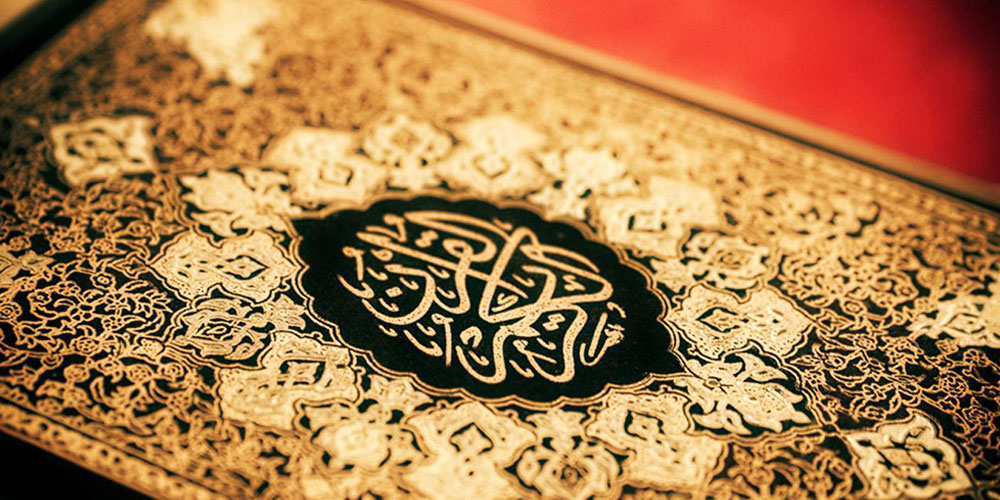
The miracle of the Qur’an (Arabic: الإعجاز القرآني) is that no human can write a book like the Qur’an, and this is a sign that the Qur’an is revealed by God. Muslim scholars consider the Qur’an to be the greatest miracle of the Prophet of Islam (s) and the sign of his prophethood. The miraculous nature of the Qur’an is a topic in Quranic sciences and Islamic theology.
Muslims consider the Qur’an to be a miracle in terms of eloquence, science, and knowledge, giving news from the unseen and the absence of contradictions in it. The Qur’an itself has pointed out the miraculous nature of this book and challenged any claims against it in six verses, i.e., it has invited the opponents to bring something similar to it if they can (Tahaddi).
Muslim scholars have written many books about the miraculous nature of the Qur’an: I’jaz al-Qur’an by Abu Bakr Baqilani (d. 403/1013), al-kalam fi wujuh i’jaz al-qur’an by al-Shaykh al-Mufid (d. 413/1022), al-Muwaddih ‘an jahat i’jaz al-Qur’an by al-Sharif al-Murtada (d. 436/1044), Dala’il al-i’jaz by ‘Abd al-Qahir Jurjani (471/1078-9).
Meaning of the miraculous nature of the Qur’an and its importance
Muslims consider the Qur’an to be a miracle of the Prophet of Islam (a). Considering it a miracle means that this book is beyond human power and is from God and no one can bring anything like it. Al-Shaykh al-Tusi, in his Tafsir al-Tibyan, considered the Qur’an to be one of the greatest and most famous miracles of the Prophet (s).
Abu Bakr Baqilani (d. 403/1013), one of the Sunni scholars, also wrote about the importance of paying attention to the miraculous nature of the Qur’an, mentioning that although the Prophet (s) had other miracles, his prophethood is based on the miracle of the Qur’an; because, his other miracles took place in certain times and conditions and before the eyes of few people; but, the Qur’an was exposed to everyone and no one denied its existence.
The Qur’an’s challenge
In the Qur’anic sciences and Islamic theology, tahaddi means the prophets’ invitation of the deniers of their prophethood to bring something similar to their miracles. The Qur’an has expressed this challenge in six verses, i.e., it asks the deniers of its miracle to bring something similar to it. These verses are called verses of Tahaddi.
Different views about the miraculous nature of the Qur’an
Muslim scholars have put forward different views on what makes the Qur’an a miracle. Most of the views that Suyuti (d. 911/1505), a prominent Sunni scholar of Quranic studies, has mentioned in al-Itqan are about the literary miracle of the Qur’an. Of course, each of these views has explained the literary miracle of the Qur’an from a different perspective.
But Muslim scholars believe that the Qur’an has other miraculous aspects as well. For example, Allama Tabataba’i (d. 1360/1402/1981), the commentator of the Qur’an, said that the miraculous aspects of the Qur’an, in addition to its eloquence, include its scope of knowledge, mentioning the Ummi characteristic of the Prophet (s), giving news from the unseen, and the absence of contradictions in the Qur’an.
Abu Bakr Baqilani, in addition to emphasizing the literary miracle of the Qur’an, also mentioned giving news from the unseen and the Ummi characteristic of the Prophet (s) among the miraculous aspects of the Qur’an. Mohammad Hadi Ma’refat (d. 2007), a scholar of Quranic studies, in addition to literary miracles, mentioned the Qur’an’s scientific and legislative miracles.
Sarfa theory
Another theory has been proposed about the miracle of the Qur’an, which is called the Sarfa theory. According to this theory, the miraculous nature of the Qur’an means that if someone intends to confront it, God would prevent him from bringing a book like it. This means that humans can write a book like the Qur’an; but God prevents them from having this ability.
According to Suyuti, in al-Itqan, Ibrahim Nazzam (lived in the 2nd/8th and 3rd/9th centuries), one of the Sunni scholars, has put forward this point of view. Sayyid Murtada and Shaykh Mufid, who were two Shiite scholars also accepted this view. According to Mohammad Hadi Ma’refat, Muslim scholars have rejected this theory, both in the past and today.
Miraculous aspects of the Qur’an
Some miraculous aspects of the Qur’an, according to Muslim scholars, are as follows:
Literary miracle
The literary miracle of the Qur’an means that the text of the Qur’an has characteristics that no human can produce a text with these characteristics. Some of these features are as follows: accurate use of words, having a new and unique style that is neither like ordinary poetry, nor like common prose, in addition to sweetness of words and pleasant rhythm.
Giving news from the unseen
According to Muslim scholars, the Qur’an informed about things from the past and the future that no one knew about. For example, no one knew the details that it told about the story of Mary (a), Noah (a) and his storm, and Joseph (a) and his brothers.
Also, after the defeat of Rome by Iran in 615 CE, the Qur’an informed that Rome would defeat Iran in less than ten years, and it happened. Predictions about the fate of some people such as Abu Lahab, Abu Jahl and the prediction of the conquest of Mecca are among the other news of the Qur’an from the unseen, which all came true.
Scientific miracle
The meaning of the scientific miracle of the Qur’an is that this book has mentioned issues about empirical sciences that were not yet discovered at that time and have never been violated ever since. Some of the issues that the commentators have attributed to the Qur’an and considered to be referring to its scientific miracle are: the rotation and translational movement of the earth, the gravitational force of the earth, the pairing of plants and animals, and the rotation of the planets in certain orbits.
Mohammad Hadi Ma’refat, the Qur’an scholar, citing the verse “We made every living thing out of water” (Qur’an 21:30), and the findings of experimental sciences regarding the origin of life from water, considered this verse among the scientific miracles of the Qur’an.
Other aspects
The legislative and the numerical miracles of the Qur’an are other aspects of the miraculous nature of the Qur’an that some Muslim thinkers have proposed.
According to the first theory, the rulings and laws that Islam has established for man, unlike human laws, include all dimensions of human existence and are in harmony with both the material dimension of man and his spiritual dimension. They provide him with worldly happiness and peace and are compatible with his nature. Since no human has the power to do this, the Qur’an should be considered as revealed by God.
The theory of numerical miracles of the Qur’an also says that the number of letters and words of the Qur’an has such an order that no writer can create such an order and this order is a sign of its miracle. For example, in the Qur’an, the word “sa’a” (hour) is mentioned as many times as the number of the hours of the day and night, i.e. twenty-four times. The word “shahr” (month) has been mentioned twelve times the same as the number of months of the year. The word “sajda” (prostration) is mentioned thirty-four times in the Qur’an, which is equal to the number of prostrations in obligatory prayers. However, this theory has many opponents.
Bibliography of the miraculous nature of the Qur’an
The miraculous nature of the Qur’an has been mentioned in the writings of Muslim scholars for centuries. In theological books, it has been used to prove the prophethood of the Prophet of Islam (s). Also, a part of the books on Quranic sciences is dedicated to this issue. In addition, the miraculous nature of the Qur’an has been independently considered as the subject of books by Muslim scholars. Some independent writings in this field are as follows:
- I’jaz al-Qur’an fi nazmih-i wa ta’lifih, Abu ‘Abd Allah Muhammad b. Zayd Wasiti (d. 306/917-8 or 307918-9), one of the famous theologians of Baghdad;
- I’jaz al-Qur’an, Ali b. ‘Isa Rummani (d. 384994-5), from the Mu’tazilites of Baghdad;
- Bayan i’jaz al-Qur’an, Abu Sulayman Hamad b. Muhammad Khattabi (d. 388/998), one of the hadith scholars of Khorasan. This book and the previous book were published in the collection of Thalath-u rasa’il fi i’jaz al-Qur’an in Egypt in 1376 A.H.
- I’jaz al-Qur’an, Qadi Abu Bakr Baqilani (d. 403/1013), which has been published in various prints and has been the subject of research by some experts.
- I’jaz al-Qur’an wa al-kalam fi wujuhih, al-Shaykh al-Mufid (d. 413/1022), a great Shiite jurist, theologian and hadith scholar.
- Al-Sarfa fi i’jaz al-Qur’an, al-Sayyid al-Murtada (d. 436/1044), a prominent Shiite theologian, jurist and scholar in Usul. This book has also been referred to under the name of al-Muwaddih ‘an jahat i’jaz al-Qur’an.
- Dala’il al-i’jaz, ‘Abd al-Qahir Jurjani (d. 471/1078-9). He was one of the first compilers of books on Arabic rhetoric. This book has been published several times and many researches have been made about it.
- Al-Risalat al-Shafiya fi i’jaz al-Qur’an, by ‘Abd al-Qahir Jurjani, which has been published in the collection of “Thalath rasa’il fi i’jaz al-Qur’an”.
- Nihayat al-ijaz fi dirayat al-i’jaz, Fakhr ad-Din Razi (d. 606/1210).
- I’jaz-i Qur’an, Sayyid Muhammad Husayn Tabataba’i. This book is an adaptation of his works, especially al-Mizan, about the miraculous nature of the Qur’an.
Also, many books, articles and theses have been written about the miraculous nature of the Qur’an. In an article, 348 works have been introduced in this field.




